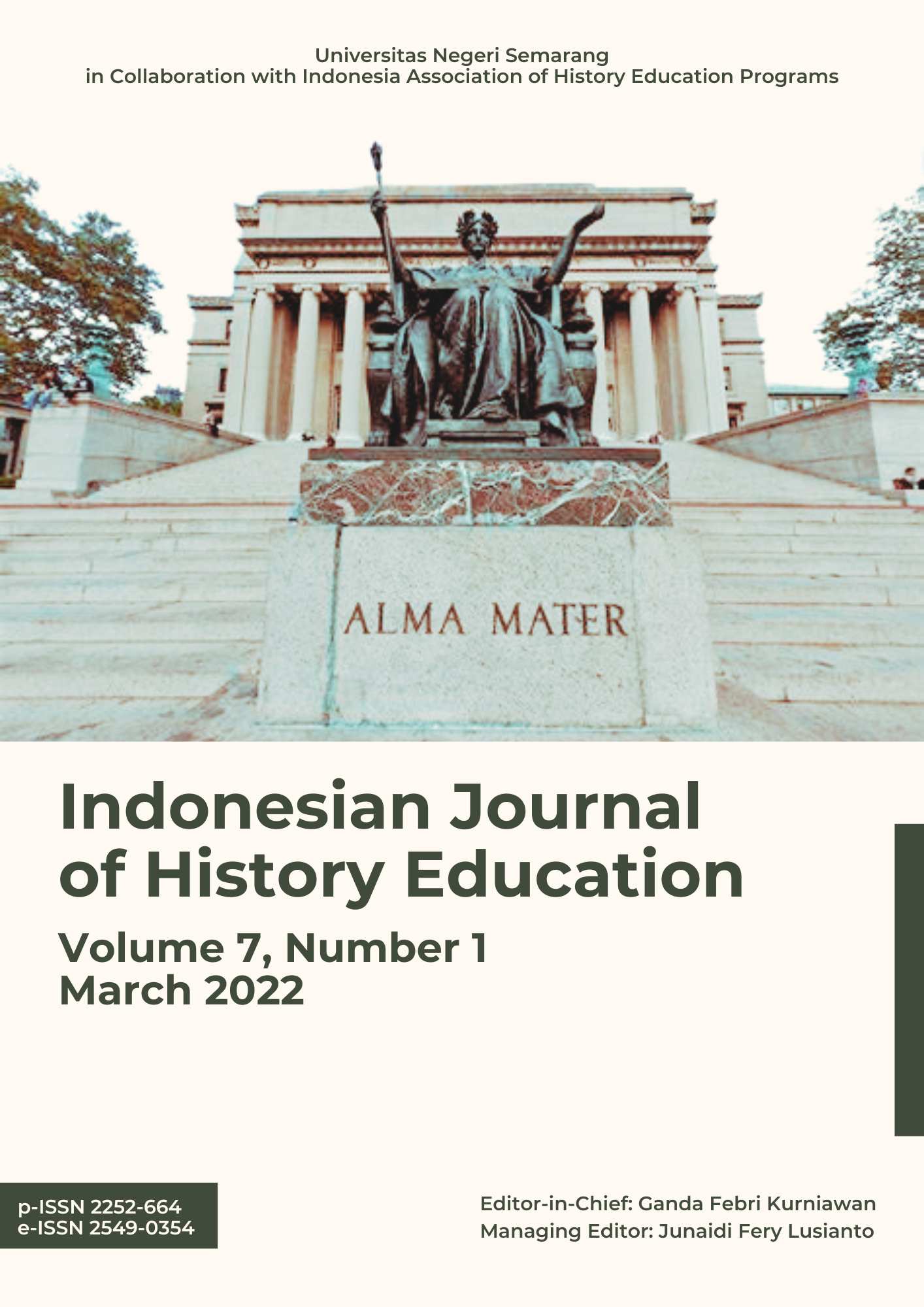Internalization of Character Education in History Learning Occupation of Japan and the Proclamation of Independence at SMK PGRI 1 Mejobo Kudus
Abstract
This research aims to determine the role of history subjects in forming the character of students at SMK PGRI 1 Mejobo Kudus, understand the process of internalizing character values in history subjects at SMK PGRI 1 Mejobo Kudus, and determine the influence of internalization of character education on student learning outcomes on the material on the Japanese Occupation and the Proclamation of Independence of the Republic of Indonesia. This research approach is a mixed method with a concurrent embedded strategy. The samples in this study, classes XRPL, X AKL, and X TKKR 1 were taken using simple random and purposive sampling techniques. Data collection techniques use observation techniques, tests, student behavior measurement scales, interviews, and documentation. The research results show that history has a role in character formation by inserting character values into learning. Internalizing character education starts with preparing learning plans and ends with evaluating history learning. Simple linear regression obtained a significant value (Asymp. Sig 2-tailed) 0.2. The residual value is usually distributed normally because the significant value is greater than 0.05. This means there is a positive influence between the internalization of character education and learning outcomes. Of the 40 respondents, 72.5% of the students showed they had completed learning the material on the Japanese Occupation and the Proclamation of Indonesian Independence.
References
Ahmad, T. A. (2014). “Kendala Guru Dalam Internalisasi Nilai Karakter Pada Pembelajaran Sejarah”. Jurnal Khazanah Pendidikan, Vol. 7.(1), h.
Ainissyifa, H. (2017). Pendidikan karakter dalam perspektif pendidikan Islam. Jurnal Pendidikan UNIGA, 8(1), 1-26.
Alex A. & Kaun C. T. (2012). “Bring Character Education into Classroom”. European Journal Of Educational Research, Vol. 1, (2), pp. 163-170.
Creswell, J. W. (2017). Research Design: Pendekatan Kualitatif, Kuantitatif, dan Mixed. Yogyakarta: Pustaka Belajar.
Fadilah, M. P., Alim, W. S., Zumrudiana, A., Lestari, I. W., Baidawi, A., Elisanti, A. D., & KM, S. (2021). Pendidikan karakter. Agrapana Media.
Fitri. (2012). Reinventing Human Character: Pendidika Karakter Berbasis Nilai dan Etika di Sekolah. Yogyakarta: Ar-Ruzz Media.
Hamid, A., & Putu S. (2013). “Penanaman Nilai-Nilai Karakter Siswa SMK Salafiah Prodi TKJ Kajen Margoyoso Pati Jawa Tengah”. Jurnal Pendidikan Vokasi, Vol. 3, (2), pp. 138-152.
Hasan, S. H. (2012). Pendidikan sejarah untuk memperkuat pendidikan karakter. Paramita: Historical Studies Journal, 22(1).
Jalil, A. (2016). Karakter pendidikan untuk membentuk pendidikan karakter. Nadwa: Jurnal Pendidikan Islam, 6(2), 175-194.
Kartodirdjo, S. (2016). Pendekatan Ilmu Sosial dalam Metodologi Sejarah.Yogyakarta: Ombak.
Lickona, T. (2013). Educating for Character: Mendidik untuk Membentuk Karakter, terj. Juma Wadu Wamaungu dan Editor Uyu Wahyuddin dan Suryani. Jakarta: Bumi Aksara.
Muchtar, D., & Suryani, A. (2019). Pendidikan karakter menurut kemendikbud. Edumaspul: Jurnal Pendidikan, 3(2), 50-57.
Mu'in, F. (2011). Pendidikan karakter. Scripta Cendekia.
Musbikin, I. (2021). Pendidikan karakter disiplin. Nusamedia.
Mustari, M., & Rahman, M. T. (2011). Nilai karakter: Refleksi untuk pendidikan karakter.
Slameto. (2003). Belajar dan Faktor-Faktor Yang Mempengaruhinya. Jakarta: Rineka Cipta.
Sofiani, Y. (2016). “Pembelajaran Sejarah Berbasis Muatan Kearifan Lokal sebagai Sarana Peserta Didik Mendapatkan Hidden Value yang Dapat Dijadikan Pelajaran dalam Memaknai Kehidupan Sehari-Hari”. Dalam Mulyana, Agus., Dyah Kumalasari, dan Aman (Ed.). Prosiding Seminar Nasional Program Studi Pendidikan Sejarah se-Indonesia: Kajian Muatan dan Posisi Mata Pelajaran Sejarah di Kurikulum 2013. Yogyakarta: Tim Penerbit Fakultas Ilmu Sosial Universitas Negeri Yogyakarta.
Sudrajat, A. (2011). Mengapa pendidikan karakter?. Jurnal Pendidikan Karakter, 1(1).
Suharso, R. (2016). “Dream To Be Real: Diskursus Pendidikan Karakter Dalam Pembelajaran IPS Di SMP Kebon Dalem Semarang”. Jurnal Harmony, Vol. 2, (1), pp. 74–84.
Sukatin, S. P. I., & Al-Faruq, M. S. S. (2021). Pendidikan Karakter. Deepublish.
Suparmini. (2013). “Internalisasi pendidikan islam dalam membangun karakter siswa (studi kasus di sekolah dasar negeri mangkubumen kidul no.16 surakarta)”. Tesis. Surakarta: Progam Studi Pendidikan Islam Universitas Muhammadiyah Surakarta.
Sutarmi, Raharjo, T.J., Pramono, S. E. (2016). “Implementasi Pelaksanaan Pendidikan Karakter sebagai Landasan Wawasan Kebangsaan di SMK Negeri 1 Kendal Kabupaten Kendal”. Journal of Education Social Studies, Vol. 5 (2), pp. 126 144.
Tutuk, N. (2015). Implementasi pendidikan karakter. Purwokerto : Stain Press
Winarsih, I. (2017). “Peranan Pembelajaran Sejarah dalam Penanaman Nilai Karakter Religius dan Naionalisme di MAN Temanggung Tahun Ajaran 2016/2017”. Skripsi. Semarang: Fakultas Ilmu Sosial Universitas Negeri Semarang
Copyright (c) 2022 Indonesian Journal of History Education

This work is licensed under a Creative Commons Attribution 4.0 International License.
Copyright Notice
An author who publishes in the Jurnal Indonesian Journal of History Education agrees to the following terms:
- Author retains the copyright and grants the journal the right of first publication of the work simultaneously licensed under the Creative Commons Attribution-ShareAlike 4.0 License that allows others to share the work with an acknowledgement of the work's authorship and initial publication in this journal
- Author is able to enter into separate, additional contractual arrangements for the non-exclusive distribution of the journal's published version of the work (e.g., post it to an institutional repository or publish it in a book) with the acknowledgement of its initial publication in this journal.
- Author is permitted and encouraged to post his/her work online (e.g., in institutional repositories or on their website) prior to and during the submission process, as it can lead to productive exchanges, as well as earlier and greater citation of the published work (See The Effect of Open Access).
Read more about the Creative Commons Attribution-ShareAlike 4.0 Licence here: https://creativecommons.org/licenses/by-sa/4.0/.




